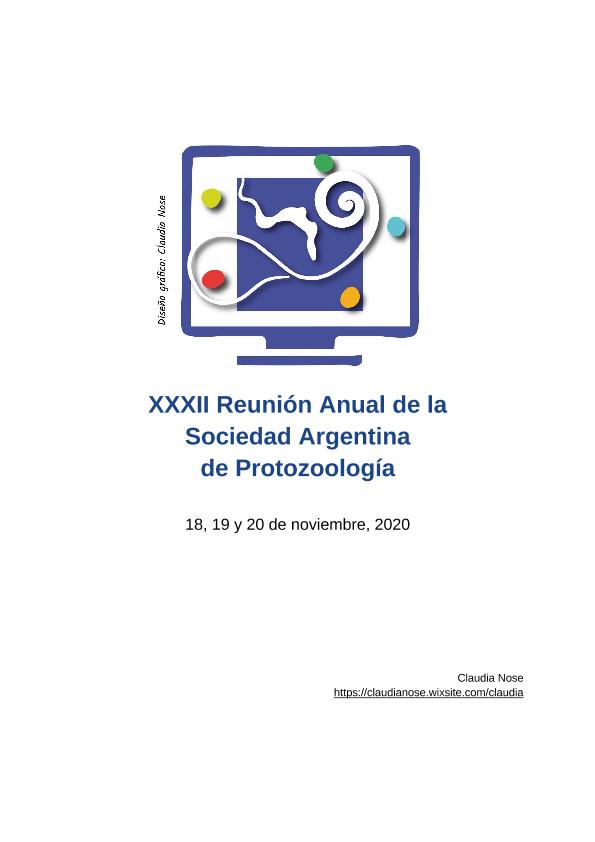Evento
In silico and molecular characterization of Q4D1D9_TRYCC, a novel high-molecular weight antigen from Trypanosoma cruzi
Ossowski, Micaela Soledad ; Gallardo, Juan Pablo; Niborski, Leticia Laura
; Gallardo, Juan Pablo; Niborski, Leticia Laura ; Mariño, Karina Valeria
; Mariño, Karina Valeria ; Santos, Javier
; Santos, Javier ; Potenza, Mariana
; Potenza, Mariana ; Gomez, Karina Andrea
; Gomez, Karina Andrea
 ; Gallardo, Juan Pablo; Niborski, Leticia Laura
; Gallardo, Juan Pablo; Niborski, Leticia Laura ; Mariño, Karina Valeria
; Mariño, Karina Valeria ; Santos, Javier
; Santos, Javier ; Potenza, Mariana
; Potenza, Mariana ; Gomez, Karina Andrea
; Gomez, Karina Andrea
Colaboradores:
Riarte, Adelina Rosa; Longhi, Silvia Andrea ; Frank, Fernanda María
; Frank, Fernanda María
 ; Frank, Fernanda María
; Frank, Fernanda María
Tipo del evento:
Reunión
Nombre del evento:
XXXII Reunión Anual de la Sociedad Argentina de Protozoología
Fecha del evento:
18/11/2020
Institución Organizadora:
Sociedad Argentina de Protozoologia;
Título del Libro:
Libro de resúmenes de la XXXII Reunión Anual de la Sociedad Argentina de Protozoología
Editorial:
Sociedad Argentina de Protozoología
Idioma:
Español
Clasificación temática:
Resumen
Chagas illness, a potentially life-threatening disease, is an infection caused by thehemoflagellate parasite Trypanosoma cruzi. By phage display technology, involving cDNAisolated from B cells of patients with chronic Chagas disease (CCC), we selected arecombinant monoclonal antibody, named scFv 6B6, which recognized a protein of ~300kDa only expressed in T. cruzi. Although preliminary, data showed that only plasma frompatients with CCC but not those from with Leishmaniasis or non-infected subjects reactedagainst 6B6 antigen. In this work, immunoprecipitation coupled to mass spectrometryrevealed that 6B6 antigen was a hypothetical protein of 323 kDa, named Q4D1D9_TRYCC.According to phylogenetic analysis, this protein is highly conserved throughout evolution inall linages of T. cruzi so far identified but lacks orthologues in other kinetoplastid parasites.In parallel, bioinformatic approaches established that this protein has the most commonlypost-translational modifications (acetylation, glycosylation, among others) identified in T.cruzi and the B cell epitopes predictors mapped that almost the entirely protein sequence isimmunogenic. Structural predictions using RaptorX server allowed us to foretell six structuraldomains of Q4D1D9_TRYCC. Interestingly, we found that this protein presentspyrroloquinoline quinone-dependent alcohol dehydrogenase (PQQ) domains, an enzymefunction that has not been yet documented in Trypanosomatids. We hypothesize that theenzymatic activity of Q4D1D9_TRYCC may be involved in some detoxification processexerted by the parasite during the mammalian host invasion. To date, our finding allowed theidentification of a novel T. cruzi protein as a promising diagnostic candidate for Chagasdisease. Moreover, the inhibition of its enzymatic activity could be tested for thedevelopment of new drugs against T. cruzi.
Archivos asociados
Licencia
Identificadores
Colecciones
Eventos(IBYME)
Eventos de INST.DE BIOLOGIA Y MEDICINA EXPERIMENTAL (I)
Eventos de INST.DE BIOLOGIA Y MEDICINA EXPERIMENTAL (I)
Eventos(INGEBI)
Eventos de INST.DE INVEST.EN ING.GENETICA Y BIOL.MOLECULAR "DR. HECTOR N TORRES"
Eventos de INST.DE INVEST.EN ING.GENETICA Y BIOL.MOLECULAR "DR. HECTOR N TORRES"
Citación
In silico and molecular characterization of Q4D1D9_TRYCC, a novel high-molecular weight antigen from Trypanosoma cruzi; XXXII Reunión Anual de la Sociedad Argentina de Protozoología; Ciudad Autónoma de Buenos Aires; Argentina; 2020; 38-38
Compartir



